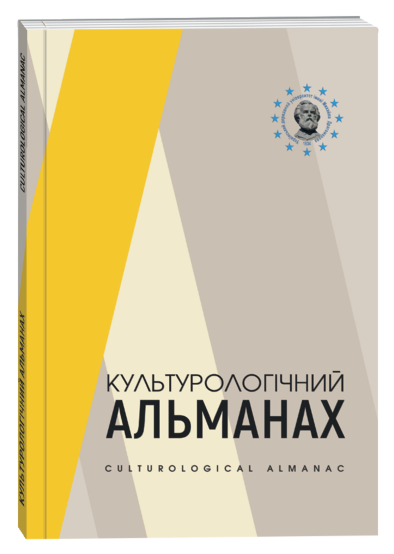THE CATEGORY OF THE INDIFFERENT AS THE LOGICAL BEGINNING OF THE THEORY OF THE AESTHETIC PROCESS IN A.S. CANARSKY
DOI:
https://doi.org/10.31392/cult.alm.2022.3.21Keywords:
Kanarskyi, Hegel, dialectics, indifference, sensuality, deafblindness, formation of the psycheAbstract
The article examines the role of the ‘indifferent’ category in the formation of human sensuality. This study takes place within the framework of the Hegelian tradition in Ukrainian philosophy of the 20th century, which determines the emphasis on the deployment and transition of the category of ‘indifferent’ into its opposite in the process of mastering the cultural heritage of humanity by an individual in the course of his own active subjectpractical activity. An attempt is made to prove the successful use of Hegel’s dialectical logic and the development of the dialectical tradition in Ukrainian philosophy by the Kyiv esthetician A.S. Canarsky. It is pointed out his conscious use of the method of ascent from the abstract to the concrete in the field of aesthetics, where the initial category is ‘indifferent’ by analogy with the category ‘pure being’, which in the process of development turns into its opposite – the category of ‘aesthetic’. The authors of the article emphasize the coincidence of the problems of the formation of human sensuality in aesthetics, psychology and pedagogy. As evidence, the Zagorsky experiment on the formation of consciousness and sensibility in deaf-blind children is cited, where, according to the authors of the experiment, a pedagogical technique based on dialectical-materialist epistemology was consciously implemented. On the contrary, the inability of empirical materialist epistemology to explain the course and results of this experiment is shown. On the other hand, the introduction of dialectical thinking in aesthetics forces Kanarsky to turn to the history of the emergence and development of human needs, and accordingly, human sensuality, which is not inherent in Hegel’s idealistic philosophy, but belongs to the materialist dialectical tradition of theoretical thinking. It is in it that the best understanding of the category of ‘indifferent’ is possible and its use in pedagogy and psychology for a better understanding of the formation of human sensibility and consciousness.
References
Козловський В.П. (2020). Чи потрібний нам Геґель? (нотатки читача до українського перекладу «Феноменології духу»). Наукові записки НаУКМА. Філософія та релігієзнавство. Вип. 5. С. 90–102.
Геґель і українська філософія 70-80-х років / В.П. Козловський та ін. Sententiae. (2020). Вип. 39(2). С. 241–250.
Геґель і українська філософія 70-80-х років. Частина ІІ / В.П. Козловський та ін. Sententiae. (2021). Вип. 40(1). С. 175–199.
Чайка Т., Малахов В. (1997). Про київського естетика А. С. Канарського і його гурток. Київські обрії: історико-філософські нариси / ред.: В. Горський, М. Ткачук. Київ : Стилос. С. 194–202.
Загорський M. О наследии Канарского. Пропаганда: научно-популярный журнал : веб-сайт. URL: http://propaganda-journal.net/9344.html (дата звернення: 29.12.2014).
Канарский А.С. (2008). Диалектика эстетического процесса. Киев, 2008. 380 с.
Гегель Г.В.Ф. (1974). Энциклопедия философских наук. Наука логики. Москва : «Мысль». Т. 1. 452 c.








